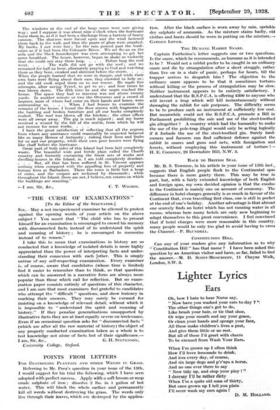" THE CURSE OF EXAMINATIONS " [To the Editor of
the SPECTATOR.]
Sin,—May a not inexperienced examiner be allowed to protest against the opening words of your article on the above subject ?- You assert that " The child who has to present himself for an examination is encouraged to crowd his memory with disconnected facts instead of to understand the spirit and meaning of history ; he is encouraged to memorize instead of to reason."
I take this to mean that examinations in history are so conducted that a knowledge of isolated details is more highly appreciated than the power of interpreting facts and under- standing their connexion with each (other. This is simply untrue of any self-respecting examination. Every examiner is, of course, aware that candidates (whose time is limited) find it easier to remember than to think, so that questions which can be answered in a narrative form are always more popular than those which call for reflection. But no exam- ination paper consists entirely of questions of this character, and I am sure that most examiners feel grateful to candidates who attempt the " difficult " questions, and show leniency in marking their answers. They may surely be excused for insisting on a knowledge of relevant detail, without which it is impossible to " understand the spirit and meaning of history." If they penalize generalizations unsupported by illustrative facts they are at least equally severe on irrelevance. Even if an occasional question asks for " disconnected facts " (which are after all the raw material of history) the object of any properly conducted examination taken as a whole is to test knowledge not alone of facts but of their signifimnee.— I am, Sir, &c., G. H. STEVENSON. University College, Oxford.




































 Previous page
Previous page